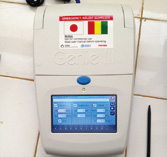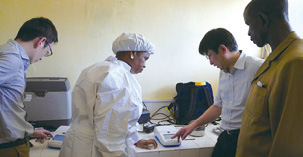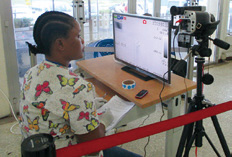Guinea and Liberia:
The Project to Implement Emergency Measures in Responses to the Ebola Virus Disease Outbreak
April 5, 2016
Since March 2014, concern about an outbreak of infection from the Ebola virus has made it difficult to cross into and move within Guinea and Liberia. How was JICS able to promptly provide remote procurement via Japan in response to requests from the governments of these two countries?

Guinea
Yuriko Hayashi
Second Procurement Management Division
Second Management Department
- Project Name: Emergency Grant Aid for the Republic of Guinea (response to the Ebola virus outbreak)
- Objective: To procure personal protective equipment (PPE), medical supplies, testing instruments, and other items for national coordination units and medical institutions in response to the outbreak of the Ebola virus in the Republic of Guinea
- Counterpart of Agent Agreement: Ministry of International Cooperation, Republic of Guinea
- Grant Amount: ¥389.94 million
- Exchange of Notes (Bilateral Agreement): November 14, 2014

Liberia
Tomoko Nomura
First Procurement Management Division
Second Management Department
- Project Name: Emergency Grant Aid for the Republic of Liberia (response to the Ebola virus outbreak)
- Objective: To procure personal protective equipment (PPE), masks, medical equipment, and other items for the Ebola Command Center in Liberia
- Counterpart of Agent Agreement: Embassy of the Republic of Liberia in Tokyo P Grant Amount: ¥389.94 million
- Exchange of Notes (Bilateral Agreement): November 12, 2014
Conducting Procurement through Remote Operation
Guinea suffered a mass outbreak of the Ebola virus in March 2014, and infection spread to the neighboring countries of Sierra Leone and Liberia as it rampaged throughout West Africa.
In response, at the UN General Assembly held in New York on September 25 of the same year, Japanese Prime Minister Abe pledged additional support of US$40 million (approximately ¥4.4 billion). In November, a portion of this funding was determined as bilateral emergency grant aid for three West African countries (Guinea, Liberia, and Sierra Leone). Of these, JICS was designated the procurement agent for support to Guinea and Liberia.
With the number of infected people rising on a daily basis, entry into Guinea and Liberia was restricted. As meeting directly with the executing institutions was not possible, this support had to be provided remotely, via telephone, e-mail, and through confirmations and liaison with local coordinators. In response to rising demand, global supplies were running short for personal protective equipment (PPE) needed as the Ebola
virus disease outbreak continued. Through multiple corporate referrals based on its experience of procuring protective clothing for past projects, as soon as they were located JICS was able to secure items meeting the various specifications and requirements. Coordinating with multiple suppliers of protective clothing, goggles, and other items, JICS ourselves arranged air transport of the items which is usually done by suppliers.
As available cargo space on the day would determine when the procured materials could be delivered, once delivery arrangements had been made, each day we communicated with transport companies, asking them to deliver the supplies to their destination as quickly as possible.
Ongoing Procurement to Contain the Spread of Infection and Prevent Recurrence

Rapid detection kit, capable of detecting Ebola virus genes in 15 minutes (Guinea)

Professor Jiro Yasuda (second from right) and Assistant Professor Yohei Kurosaki (left) of the Institute of Tropical Medicine, Nagasaki University (NEKKEN) training local staff (Guinea)

Thermography in operation at an airport (Liberia)
Having secured sufficient protective clothing due to support from other countries, although the Government of the Republic of Guinea is still suffering from the outbreak, JICS is procuring drugs and other necessary items to meet the needs of Guinea.
Furthermore, responding to a request from the government, rapid detection kits for the Ebola virus developed via industry–academia collaboration (Nagasaki University and Toshiba Corporation) have been procured, and local training on their use was executed.
Meanwhile, Liberia, where the World Health Organization announced on May 9, 2015, that the disease had been contained, In addition to using thermography as a border measure at airports, ports, and universities, JICS is steadily procuring beds, pulse oxymeters, and other items to help enhance medical and healthcare equipment.
In the event of acute infectious diseases such as the Ebola virus, local contagion conditions must be identified, and decisions about necessary supplies made rapidly. We believe that our experience in quickly conducting remote operations to meet local needs in these two countries is extremely meaningful for future projects of a highly urgent nature.
Excerpts from the Japan International Cooperation System Annual Report 2015


Stakeholder Comment
When the Ebola virus disease outbreak was confirmed in March 2014, the Japanese government was one of the first responders to the Government of the Republic of Guinea's requests for aid.
Through this project, we received donations of medical supplies, PPE, and rapid detection kits, as well as training on how to use the kits. This assistance, immediately received as the number of infected individuals was mounting rapidly, went a long way toward containing the outbreak.
The national coordination unit is extremely thankful for and satisfied with the aid Japan provided. Japan's contributions have enabled us to near our goal of eradicating Ebola. I believe this cooperation is evidence of the positive relations between our two countries, as described in the proverb “A friend in need is a friend indeed.” I offer my heartfelt thanks to the people of Japan.
Dr. Sakoba Keita
National Coordinator of the Fight against Ebola Virus
Republic of Guinea